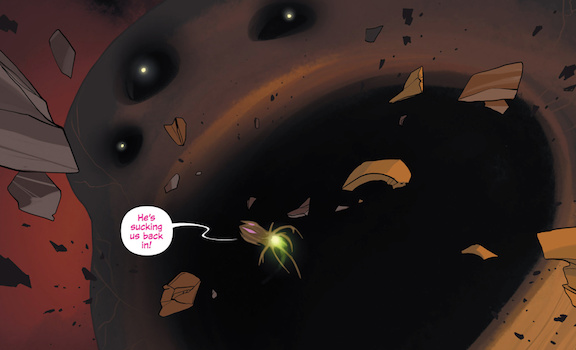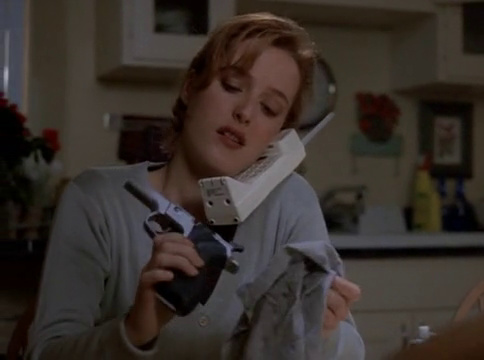DON’T YOU HATE IT WHEN YOU ORDER PEOPLE IN A RESTAURANT AND THEY’RE RUNNY? :(
—LorrdFfuzyLogik on YouTube
The conceit of The Human Centipede is gruesome because it’s recognizable. “Every morning there are mountains to climb / taking all my time away” sings Grimes, and finding the pass is like trying to avoid eating someone else’s shit. At 4 AM it’s funny that the calculus of getting your shit together is time. My own efforts to wrangle the beast of free time have only, in a Gary Larson-esque scenario, distracted me from the stampede headed my way.
Just last week I climbed a mountain only as a way, in Grimes’ metaphor, to climb mountains. Cynicism says it was a way to kill time, but when I conceived of the plan, I only wanted to drown out the ways my past self gets hold of me.
In Saga, a timesuck is a planetary-sized baby with gravity to match, who squirts black goo at any who dare fight it. Seems about right. The monstrosity of timesuck is an avatar of capitalist anxiety. Saga also has it that the opposite of war is not peace (“merely a pause between violence”), but fucking. In roughly the same logic, it’s not that timesuck is a utopia, but the other side of the coin of productivity. Without time–not the cosmic stuff of science fiction or myth, but the resource–there is nothing to suck. Time, the zombie technology amok in computer systems that when they poll the time servers seem to be maintaining fidelity to a real thing that in reality only exists through elaborate maintenace, is what begoos all attempts to escape.

A bohemian income comes with frugality, and frugality encourages ruling over your beautiful fecal kingdom; you are the last person in the centipede. I look through my pantry for ideas on what to cook. I excavate my twelve-year-old camera and begin taking pictures solely because to do otherwise would be to let my once-expensive camera go to waste. The now ancient practice of keeping a music library on my hard drive has me listening to recordings for which I can no longer sustain the fantasy. I did a clean OS install three months ago and already I have at least fifty gigabtyes of television and movies I’m certain I’ll never watch, except when I’m on the verge of deleting them.
A good day (why do I italicize every word, as if I’m putting every idiom in a petri dish?) is, I’ve found, often disturbingly dependent on the liberty of money. The more I am financially liquid, the less beholden to my plopping treasures I am. (In my own life this means, say, buying popcorn at the movies.) I think “live in the moment,” as Ashland lifestyle op-eds advise, might have meaning other than “don’t save your money,” but I’ll have to get back to you on that.
I didn’t climb a mountain to climb mountains until a week after I had thought about doing so. I followed an old formula for evading my old formulas. The morning before leaving was one of deeper than usual confusion: Why was I climbing a mountain? As I got closer to getting out the door, staying home seemed brighter and brighter. At the top of one hill with a view I stopped and thought, this is enough. Yet I went on, because the sense that I wasn’t exploiting my outing to the fullest extent nagged at me. I was gone so long I had to shit in the woods.
I don’t want to give a shit (even literally) that some asshole bought beets, put them in my fridge, and demanded I find some way to eat them. (The meaning of asshole becomes clear to me now: one who dumps their problems onto others.)
“I never thought I’d say this to you, Scully, but you smell bad,” ends an episode of The X-Files, “War of the Coprophages.” The feuding shit-eaters are Scully and Mulder: Scully on the phone getting off on Mulder’s shit, and Mulder off in bumfuck, Massachusetts (the most anal retentive state of the union?), chasing after other people’s shit. At first metaphorically, then, in the end, he discovers the source of the mysterious cockroaches is a warehouse full of feces. “You smell bad” is a romantic declaration; Mulder will solicit but never share Scully’s perspective, and Scully will never have to worry about contending with the blindness that would come of agreeing with Mulder. Despite spending their working lives together, the two will never relax into shared interests. Their relationship is sometimes described as an egaltarian meeting of minds, but this episode brings out the truth that they are two segments of a sequence, the first seeking a way to become second.
Scully’s love of Mulder is as Chris Kraus describes Jane Eyre’s love of Rochester: a “fondness for bad art.” Picking up Mulder’s phone calls as she goes about her dull life at home, Scully dispatches theory after sloppy theory. “Bad art makes the viewer much more active,” notes Kraus. Mulder may be onto something when he muses “might they not have also been able to perfect the extraction of methane from manure, an abundant and replenishing energy source on a planet filled with dung-producing creatures?”
